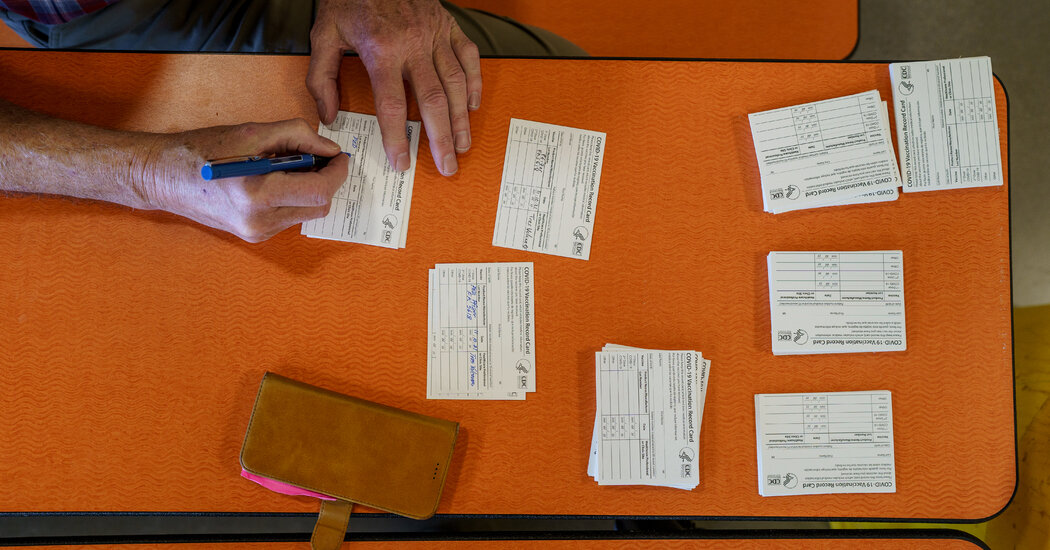It never quite fit in your wallet, so it’s no surprise you may have misplaced it by now.
More than a year ago, when Covid-19 vaccines became available and jabs started going into arms, it became a point of pride for some people to show off a bandaged shoulder and a white Covid-19 Vaccination Record card.
But as the coronavirus pandemic rolled on, and the bandages came off, some people simply lost track of those awkward 4.25-by-3.5-inch white cards.
And now, you may really need yours.
But what if you lost it?
Relax.
Many health departments can provide you with your vaccination information. The records themselves aren’t lost.
But if you’re hoping to use that card to prove your vaccination status at work or, say, to travel to one of those countries with a more digital-first approach to record keeping, losing it may make it harder for you to take part in those markers of everyday life like being around other people. Here’s what to do.
Your vaccination records might be on your phone.
You could be lucky enough to live in one of the states that let people access their vaccination records from their smartphones. Those states include Arizona, California, Colorado, Connecticut, Delaware, Hawaii, Illinois, Indiana, Louisiana, Maryland, Massachusetts, Mississippi, New Jersey, New York, North Dakota, Rhode Island, Utah and Washington.
Other states have websites where vaccination information can be requested, usually as a PDF or email. Those states include Michigan, Minnesota, New Mexico, North Carolina, Oklahoma, and Wisconsin.
Things get a little more complicated if you’re in one of the states that didn’t go digital, unfortunately.
Could your doctor give you another card?
It depends. Your doctor might have extra C.D.C.-issued white cards. But they should at least have a record of when and where you received your vaccine shot(s) and booster(s). Ask them.
And most states require health care providers who administer vaccine shots to log that information with state health officials. So, state health officials should have that info too.
But no, the C.D.C. will not send you another one.
It wasn’t actually the Centers for Disease Control and Prevention that gave you that card bearing its logo. The agency provides them to state health departments, which in turn give them to local vaccination providers. Those local providers give them to people when they get their shots. So, don’t call your friend’s cousin who works there looking for a favor.
I was vaccinated at CVS. Or Walmart. Or Walgreens. Can they replace my card?
You’re in luck.
-
CVS: A record of the vaccination is available to patients via the CVS Pharmacy app, or on the company’s website, a spokesman said. A pharmacy employee can print a paper record for you, the spokesman said.
-
Walgreens: The company keeps records of all vaccinations administered by its pharmacies, according to a spokeswoman. If patients lose their physical card, they are encouraged to contact their pharmacy for a new one, the spokeswoman said.
-
Walmart: If you were vaccinated at a store or one of its sponsored events, Walmart can verify your information and connect with your state’s immunization registry. Once that is complete, Walmart will reissue a vaccine card to reflect the doses administered at Walmart, a spokeswoman said in a statement. The company can also provide that information digitally, or via a QR code.
This is so complicated.
It is certainly easier in some places than others. Those C.D.C. cards are too big to fit in a wallet, making them unwieldy and, arguably, prone to being displaced. That’s one reason many states took a more digital approach.
In New York, for example, you can access the city Department of Health’s website and obtain vaccination records, a spokesman for the department told me.
Getting records from the city’s site, My Vaccine Record, is pretty fast. I punched in some biographical information and within seconds I got my vaccine history. It was three pages long, so I may not hang the whole thing on my fridge.
The Coronavirus Pandemic: Key Things to Know
Omicron in retreat. Though the U.S. is still facing overwhelmed hospitals and more than 2,000 deaths a day, encouraging signs are emerging as new cases start to fall nationally. The World Health Organization said that, between natural immunity through infection and vaccination, the variant offered “plausible hope for stabilization.”
Some apps work mainly as digital wallets, a place to store information on your phone until you need to show someone. Others have additional features, such as the ability to schedule Covid tests and receive alerts about potential exposures nearby.
The Excelsior Pass Plus app from New York State can show test results and vaccine records. The free app can be downloaded here.
Outside the United States, many countries have taken a more streamlined approach. In Britain, the National Health Service displays a QR code for fully vaccinated residents. Similarly, members of the European Union issue a digital Covid certificate showing that a person either is vaccinated, has tested negative or has recovered from Covid-19.
Once you get your records, save it!
Many places that require proof of vaccination will accept a picture of your Covid-19 vaccination card. So, once you get it, photograph it. Just make sure it’s in focus.
(But, uh, don’t put it on your Instagram account.)
And if you received a QR code with your vaccination records, you can store it in the digital wallet on your iPhone (with iOS 15). Those are harder to lose!
There are also apps from Clear, Common Pass, Docket, and IBM that can help you keep track of your vaccination record.
Please don’t buy, borrow or make your own vaccination card.
As with driver’s licenses and passports, there are big penalties for misrepresenting your vaccination records. Don’t be that guy. Or that guy. Or that guy. Or these guys.


























